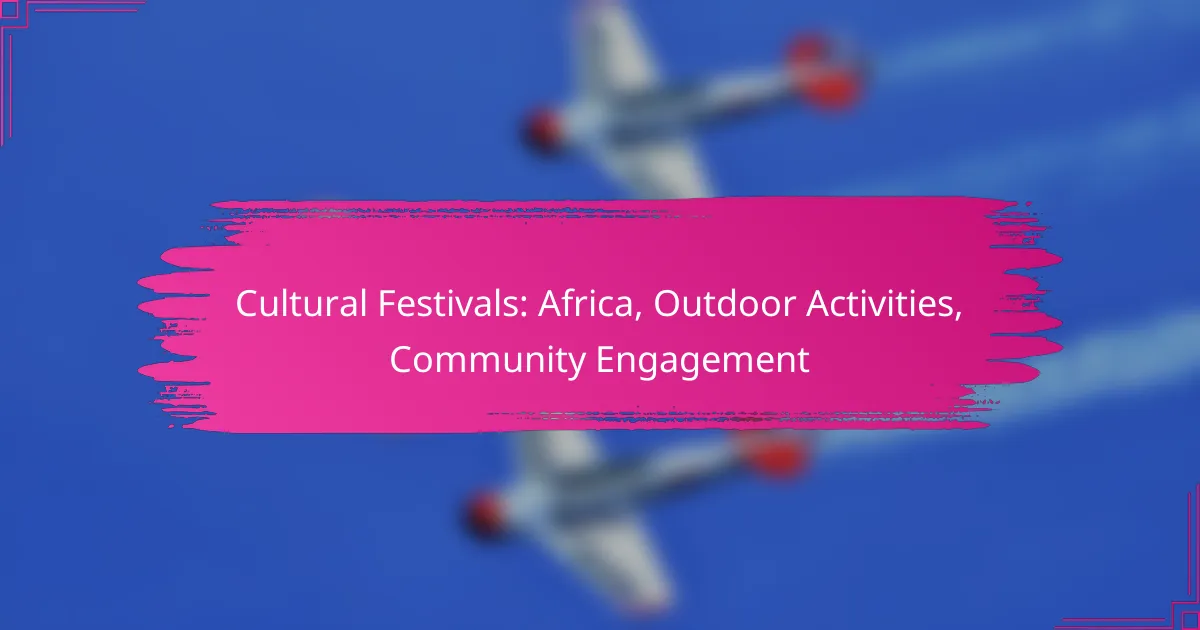Africa is home to a rich tapestry of cultural festivals that highlight its diverse heritage and foster community engagement. These vibrant events not only showcase music, art, and traditional customs but also encourage social connections and participation in local culture. Through outdoor activities and shared experiences, these festivals strengthen community bonds and celebrate the continent’s unique identity.
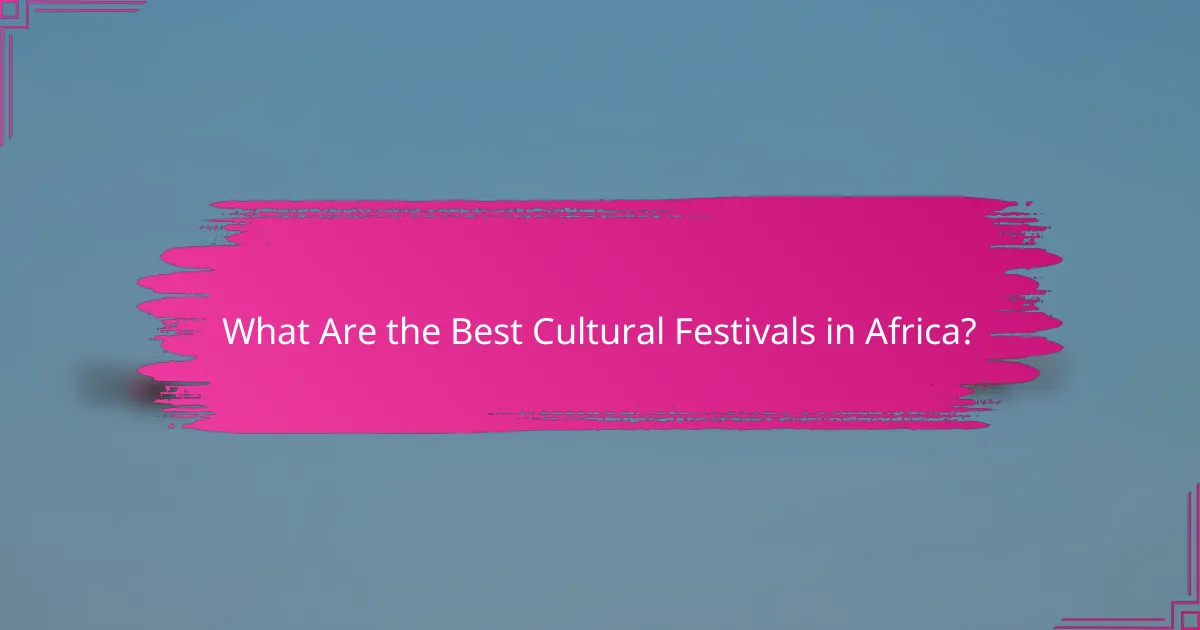
What Are the Best Cultural Festivals in Africa?
Africa hosts a vibrant array of cultural festivals that celebrate its diverse heritage, arts, and community spirit. These festivals offer unique experiences, showcasing music, film, and traditional customs, making them essential for anyone interested in the continent’s rich culture.
Fes Festival of World Sacred Music
The Fes Festival of World Sacred Music, held annually in Morocco, brings together artists from various spiritual traditions to share their music and culture. This festival typically occurs in June and features performances in stunning historical venues throughout the city of Fes.
Attendees can enjoy a variety of genres, from Sufi music to gospel, and participate in workshops and discussions that explore the intersection of music and spirituality. It’s advisable to book accommodations early, as the festival attracts a large number of visitors.
Durban International Film Festival
The Durban International Film Festival, one of Africa’s oldest film festivals, showcases a diverse selection of films from South Africa and around the globe. Taking place in July, it features screenings, workshops, and discussions that engage filmmakers and audiences alike.
This festival is a platform for emerging filmmakers and often includes a focus on social issues relevant to the African context. Attendees should consider purchasing tickets in advance, as popular screenings can sell out quickly.
Gerewol Festival
The Gerewol Festival is a unique cultural event celebrated by the Wodaabe people of Niger, typically held in September. This festival is renowned for its vibrant displays of traditional attire, music, and dance, particularly the beauty contests where men showcase their charm to attract potential brides.
Visitors can immerse themselves in the rich traditions of the Wodaabe, experiencing their hospitality and cultural practices firsthand. It’s essential to respect local customs and dress codes when attending this festival.
Lake of Stars Festival
Held on the shores of Lake Malawi, the Lake of Stars Festival is a celebration of music, arts, and culture, usually occurring in September. This festival features local and international artists, offering a mix of performances across genres, alongside art installations and workshops.
The picturesque setting enhances the experience, making it a popular choice for both locals and tourists. Attendees should prepare for varying weather conditions and consider camping options for a more immersive experience.
Harare International Festival of the Arts
The Harare International Festival of the Arts (HIFA) is Zimbabwe’s premier arts festival, typically held in April or May. It showcases a wide range of artistic expressions, including music, theater, dance, and visual arts, attracting artists from across Africa and beyond.
HIFA provides a platform for cultural exchange and dialogue, making it a must-visit for art enthusiasts. Purchasing tickets in advance is recommended, as popular performances often reach capacity quickly.
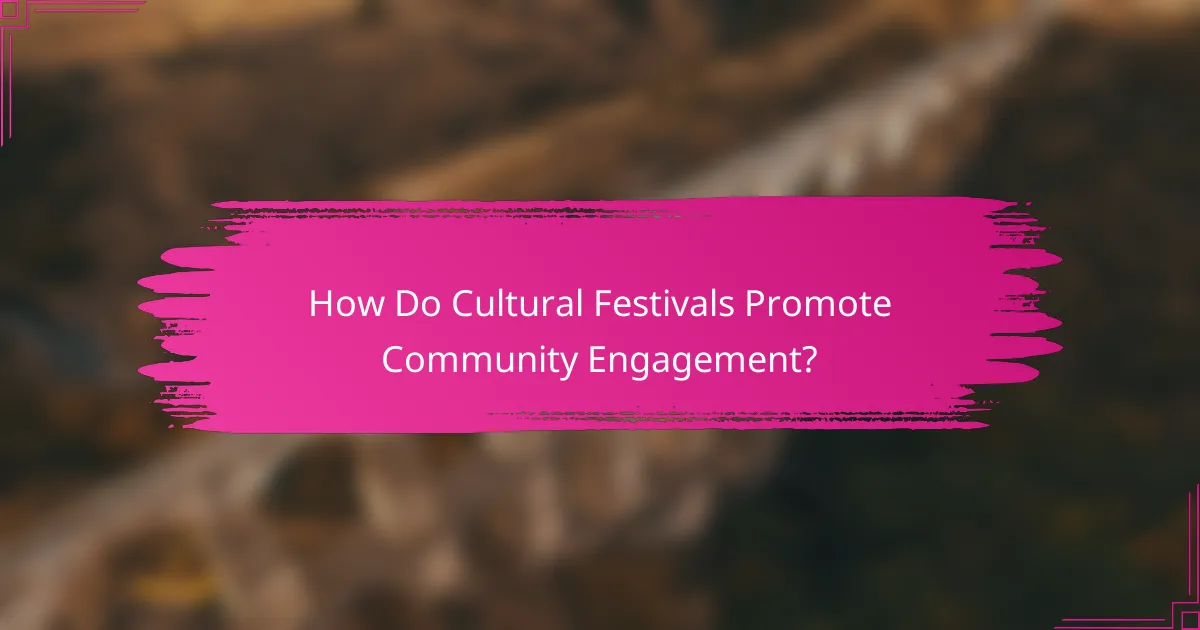
How Do Cultural Festivals Promote Community Engagement?
Cultural festivals enhance community engagement by bringing people together to celebrate shared traditions, values, and experiences. These events foster connections among residents, encouraging participation in local culture and strengthening community bonds.
Fostering Local Identity
Cultural festivals play a crucial role in fostering local identity by showcasing unique customs, art, and heritage. They provide a platform for communities to express their distinctiveness, allowing residents to take pride in their cultural background.
For example, festivals featuring traditional music, dance, and cuisine can help preserve local traditions while educating younger generations. This celebration of identity can lead to a stronger sense of belonging and community cohesion.
Encouraging Volunteer Participation
Volunteer participation is often a cornerstone of cultural festivals, as they rely on community members to help organize and run events. Engaging locals in planning and execution fosters a sense of ownership and commitment to the festival’s success.
Communities can encourage volunteerism by offering incentives such as free admission, food, or recognition for their contributions. This not only enhances the festival experience but also builds lasting relationships among volunteers and attendees.
Supporting Local Economies
Cultural festivals can significantly boost local economies by attracting visitors and stimulating spending in the area. Vendors selling food, crafts, and services benefit from increased foot traffic, while local businesses often see a rise in sales during festival periods.
For instance, a well-attended festival can lead to hundreds or thousands of dollars in revenue for local shops and restaurants. Communities can maximize these benefits by promoting the festival through local tourism boards and social media, ensuring a wider reach.
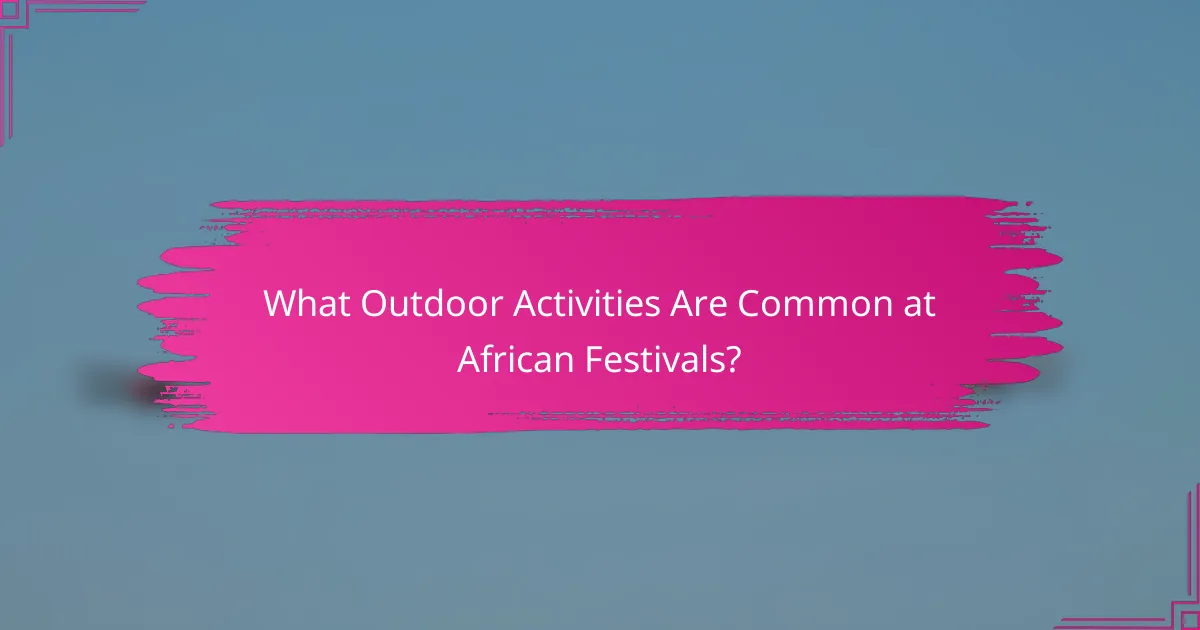
What Outdoor Activities Are Common at African Festivals?
Outdoor activities at African festivals often include vibrant cultural expressions and community engagement through various forms of entertainment, shopping, and culinary experiences. These activities not only celebrate local traditions but also foster social connections among attendees.
Traditional Dance Performances
Traditional dance performances are a hallmark of many African festivals, showcasing the rich cultural heritage of different communities. Dancers often wear colorful costumes and perform to live music, engaging the audience and inviting participation.
These performances can vary widely by region, with styles ranging from the energetic Zulu dances of South Africa to the intricate movements of the Maasai in Kenya. Attendees should consider joining in, as many festivals encourage audience participation, enhancing the communal atmosphere.
Artisan Markets
Artisan markets are a key feature of African festivals, offering a variety of handmade crafts, textiles, and jewelry. These markets provide local artisans with a platform to showcase their work and connect with visitors, promoting cultural exchange and economic support.
When visiting an artisan market, look for unique items that reflect the local culture, such as beadwork from the Ndebele people or wood carvings from Ghana. Bargaining is common, so be prepared to negotiate prices to ensure a fair deal.
Food and Drink Tasting
Food and drink tasting is an essential part of the festival experience, allowing attendees to sample traditional dishes and beverages. From spicy stews to sweet pastries, the culinary offerings often reflect the region’s agricultural produce and cultural influences.
Common items to try include jollof rice from West Africa, biltong from Southern Africa, and local beers or palm wine. Be adventurous but mindful of dietary restrictions, and consider asking vendors about ingredients to ensure a safe and enjoyable tasting experience.

How to Choose the Right Festival for Your Interests?
Choosing the right festival involves identifying your interests and aligning them with the cultural themes, location, and family-friendliness of the event. Consider what experiences you seek, whether it’s music, food, art, or community engagement, to find a festival that resonates with you.
Assessing Cultural Themes
Start by exploring the cultural themes of various festivals. Some may focus on traditional music, while others celebrate local cuisine or art. Look for festivals that highlight the cultures you are interested in, as this will enhance your overall experience.
For example, if you enjoy African music, seek out festivals that feature local artists and traditional performances. This can provide a deeper understanding of the culture and its heritage.
Evaluating Location and Accessibility
Consider the location of the festival and how accessible it is for you. Festivals in urban areas may offer better transportation options, while rural festivals might provide a unique atmosphere but require more planning to reach.
Check for nearby accommodations and transportation options, especially if the festival spans multiple days. Look for public transport routes or parking availability to avoid any last-minute hassles.
Considering Family-Friendly Options
If you are attending with family, prioritize festivals that offer family-friendly activities. Many festivals provide dedicated areas for children, including games, workshops, and performances suitable for all ages.
Review the festival’s schedule and website for information on kid-friendly activities. This can help ensure that everyone in your family has an enjoyable experience without feeling overwhelmed or bored.
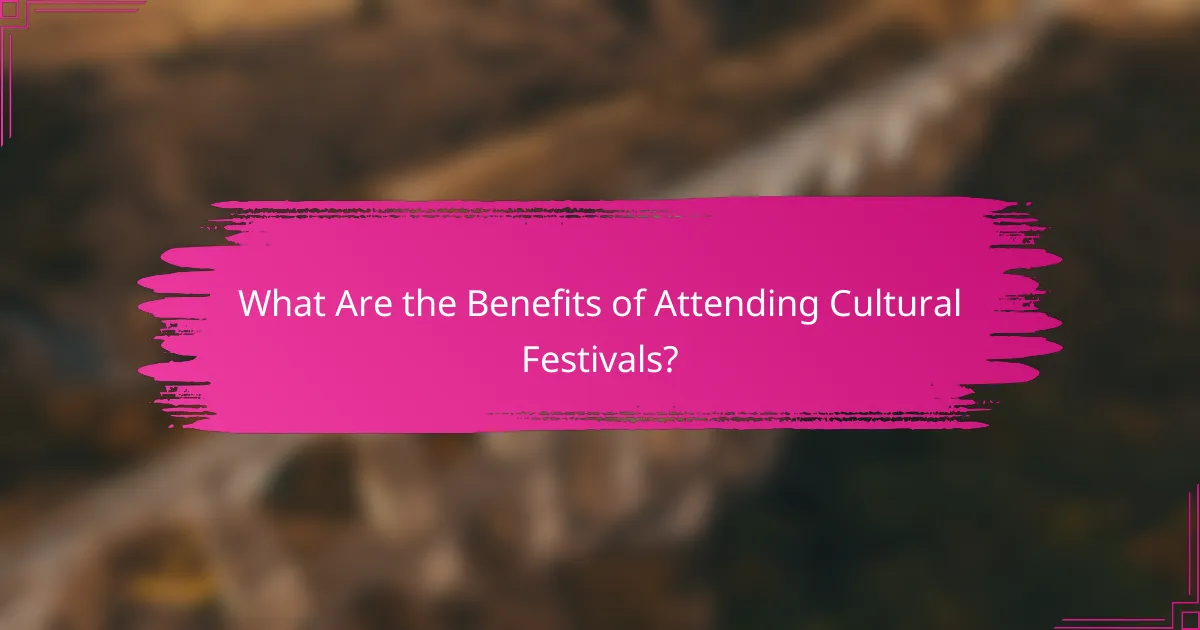
What Are the Benefits of Attending Cultural Festivals?
Attending cultural festivals offers numerous benefits, including opportunities for social interaction, exposure to different traditions, and enhancements to personal well-being. These events foster community engagement and allow individuals to connect with their heritage and others in meaningful ways.
Networking Opportunities
Cultural festivals create a vibrant environment for networking, allowing attendees to meet people from various backgrounds. This interaction can lead to new friendships, professional connections, and collaborations that may not occur in everyday life.
To maximize networking, consider engaging in conversations, exchanging contact information, and participating in group activities. Being open and approachable can significantly enhance your experience and expand your social circle.
Exposure to Diverse Cultures
One of the most enriching aspects of cultural festivals is the exposure to diverse cultures. Attendees can experience traditional music, dance, art, and cuisine, which broadens their understanding of different ways of life. This exposure fosters appreciation and respect for cultural differences.
Participating in workshops or demonstrations can deepen this understanding. For example, learning a traditional dance or cooking a regional dish can provide hands-on experience that enhances cultural appreciation.
Enhancing Personal Well-being
Attending cultural festivals can significantly enhance personal well-being by providing a sense of community and belonging. Engaging in joyful activities and celebrating shared traditions can boost mood and reduce stress.
To fully benefit from these events, prioritize participation in activities that resonate with you. Whether it’s enjoying live performances or exploring artisan crafts, immersing yourself in the festival atmosphere can lead to lasting positive feelings and connections.
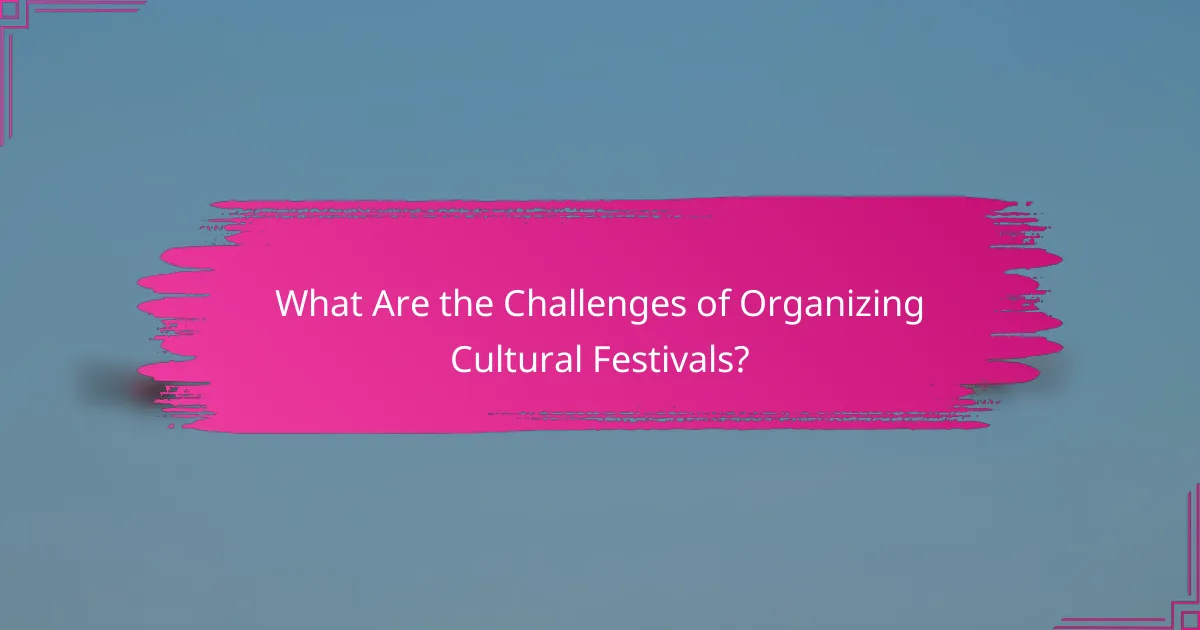
What Are the Challenges of Organizing Cultural Festivals?
Organizing cultural festivals involves various challenges, including logistical coordination, funding, and community engagement. These factors can significantly impact the success and sustainability of the event.
Logistical Coordination
Logistical coordination is crucial for the smooth execution of cultural festivals. This includes managing venue selection, scheduling performances, and ensuring adequate facilities for attendees. It’s essential to create a detailed timeline and assign responsibilities to team members to avoid last-minute issues.
Consider using project management tools to track tasks and deadlines. Regular meetings with stakeholders can help address potential problems early and keep everyone aligned on the festival’s goals.
Funding and Sponsorship
Securing funding and sponsorship is often one of the biggest hurdles in organizing cultural festivals. Costs can vary widely, ranging from venue rental to marketing expenses. It’s important to develop a comprehensive budget that outlines all potential costs and identifies funding sources.
Explore local businesses and community organizations for sponsorship opportunities. Offering promotional benefits in return can create mutually beneficial partnerships. Additionally, consider crowdfunding or applying for grants that support cultural initiatives.
Community Engagement
Effective community engagement is vital for the success of cultural festivals. Engaging local residents and stakeholders can foster a sense of ownership and encourage participation. Start by conducting surveys or hosting focus groups to gather input on the festival’s theme and activities.
Promote the festival through local media and social networks to build excitement. Collaborating with community groups can also enhance outreach efforts and ensure diverse representation in the festival’s programming.
